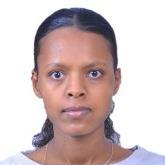
Lidiya Abebe Dejene
Work place: Addis Ababa Science and Technology University/College of Electrical and mechanical Engineering/Department of Electromechanical Engineering, Addis Ababa, Ethiopia
E-mail: lidabebe92@gmail.com
Website:
Research Interests: Computational Engineering, Engineering
Biography
Lidiya Abebe Dejene received Bsc and Msc degree in Mechatronic Engineering from Hawassa University, Hawassa and Addis Ababa Science and Technology University Addis Ababa Ethiopia, in 2016, 2022 respectively. She is currently a lecturer in Wachemo University, Ethiopia. Her research interest includes control of flapping wing micro air vehicles, Nano air vehicles, space vehicles
Author Articles
Dynamic Modelling and Control of Flapping Wing Micro Air Vehicle for Flap-Glide Flight Mode
DOI: https://doi.org/10.5815/ijem.2022.05.03, Pub. Date: 8 Oct. 2022
Flapping wing micro-air-vehicles (FWMAV) are micro-air-vehicles that use biomimetic actuation (oscillatory flapping wing) for aerodynamic force generation. The realization of such bionic flight, which offers small size, low speed, and flexible maneuverability has significant military and civilian values. Thus the design of FWMAV (ESB-I) will be very important for security related sectors since they have all the right stuffs for surveillance and reconnaissance. Since everything about a bird is made for flight the kinematic and dynamic modeling as well as control algorithm of bird like FWMAVs is more complex than that of serial robots. Thus balancing the main requirements for the design of FWMAVs which includes excellent aerodynamic performance, high efficiency, and satisfactory maneuverability is very important. With the aim to improve the performance of a FWMAV this work incorporates an intermittent flapping and gliding flight mode. Flap-gliding flight mode, which is often used by large bird species, effectively combines the aerodynamic advantages of fixed and flapping wings. Inspired from it, a kind of flexible flap-gliding Micro Air Vehicle, named Ethio-Smart Bird-I (ESB-I), was successfully designed. An expression describing the mechanical energy cost of travelling of this flight mode in terms of work per range for one flap-glide flight cycle was presented. It is shown that there is an energy saving of flap-gliding flight compared to continuous flapping flight. However due to a system dynamic variation in this flight mode, it possesses difficulty in control surface design. To implement this specific flight mode, this thesis proposes a closed-loop active disturbance rejection control, ADRC, strategy to stabilize the attitude during the processes of flapping flight, transition and gliding flight. To verify the control effect, the unsteady aerodynamic estimation method of the flapping wing based on modified strip theory approach and the dynamics of the FWMAV in Lagrangian form were modelled in the MATLAB/SIMULINK platform and applied in the simulation. Using this model longitudinal stability of ESB-I was analyzed. Simulation results show that even if the FWMAV is in different flight modes, ADRC controller can track the target pitch signal effectively with tracking error less than 0.05rad. To further explain the effects of ADRC in this specific flight mode, the control effects of a PID controller is presented. As per the simulation result ESB-I with PID controller has a target pitch angle tracking error greater than 1rad. This shows that, in flap-gliding flight mode ADRC can track the target pitch signal better than PID controller.
[...] Read more.Other Articles
Subscribe to receive issue release notifications and newsletters from MECS Press journals